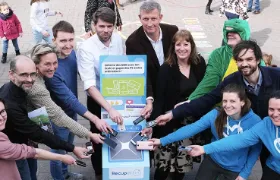Four ways in which we make a difference with sustainable mobility

Last updated on 21-05-2021
The fight against climate change is a challenge we all need to take up together. As a major Belgian player, Proximus cannot simply stand on the sidelines. However, the road is long and the end is not yet in sight. There are areas where further improvements can be made. Nevertheless, we already managed to significantly reduce our ecological footprint. In addition to the external role of our suppliers and the way we heat our buildings, tackling employee mobility is an important factor.
Between 2007 and 2015 Proximus succeeded in reducing its total CO₂ emissions by 70%. We have been a carbon neutral company since 2016, for our own activities within our direct control. In 2019, however, we found that transportation represents more than 60% of our direct carbon footprint. This impact absolutely had to be reduced. This is why we are committed to deploying a fully electric company car fleet by 2025.
We have also introduced alternative mobility solutions:
1. The mobility budget
The first step was the launch of a mobility budget to encourage employees to switch to public transport. We also made working from home even more easy by providing the necessary telecom solutions. Both initiatives aimed to reduce the number of kilometers covered by car. In addition, we gradually switched to more CO₂-friendly vehicles, to make indispensable travel greener and turn our fleet fully electric by 2025. On top of all of this, we wanted our employees to think about their own mobility.
The switch proved to be a success. In 2019 alone, 2,025 employees opted for the mobility budget instead of a company car in combination with a parking space.
2. A mobility platform to stimulate sustainable choices
In 2020, it was time for the next step. The mobility budget and the plan to that effect were further developed. More than ever, employees had to be able to freely combine the transport modes that best suited their specific situation.
The key to the solution lay in the use of a central mobility platform. To this end, Proximus joined forces with Vaigo, a leading Belgian player in this domain. A dedicated environment on a smartphone app shows all the solutions employees can choose among. The choice of public transport mode and management of the parking budget form the basis, along with fuel for the company car. But newer options, such as charging solutions for electric cars, are also available. Even leasing a bike is one of the possibilities.
3. The ecoscore system as a benchmark
To closely monitor the greening of the fleet, an ecoscore system was set up. The aim is to assess the energy performance of each vehicle, based on the main impacts it has. Just think of global warming and air pollution, but also noise pollution. Each vehicle is given a score between zero and 100: the higher the score, the more environmentally friendly.
The objective is to achieve an ecoscore of 70 or more for at least 90% of the total fleet by 2022. The next step is to have no more vehicles running on fossil fuels like gasoline or diesel by 2025. That is why today part of our fleet already consists of electric and hybrid cars. The necessary facilities for employees to recharge their vehicles electrically during working hours are also provided. In addition, our company cars are now driving on all-season tires, thus making tire changes unnecessary and reducing the number of tires needed.
4. An approach to professional travel
Apart from the transportation modes used by the employees, there was also room for improvement in the area of the provisioning of the Proximus Shops. For shops in the cities of Antwerp, Ghent, Brussels and Liège, we therefore resort to cargo bikes. This decision reduced the ecological footprint drastically. And a nice extra benefit: this method is considerably cheaper.
Our intention was also to optimize the number of kilometers covered by technicians. In this respect, an intelligent monitoring system is of paramount importance. It allows us to schedule appointments more efficiently and anticipate possible problems. Maximum use is also made of remote assistance where possible.
In all, 200 new CNG cars are used. These vehicles run on compressed natural gas, which is much more environmentally friendly than diesel or petrol. Again, however, this is only a transitional phase towards a fully electric fleet.
Get involved and put your heart into tackling climate change. Do you have an old phone lying about? Then bring it in. We will ensure that the precious materials are recycled. And, in exchange, you’ll receive a voucher worth at least €10.


